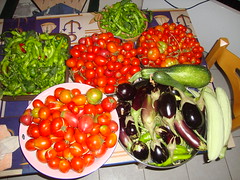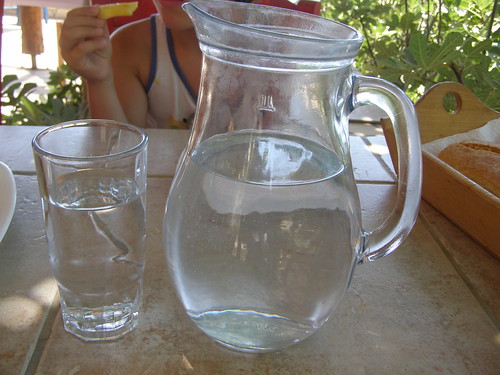My dear children, and perhaps especially, dear Son, because you are starting junior high school under a difficult socio-political climate in your home country, with promised disruptions and barriers to your education, and your well-being in general,
You know how I feel about Greek school. It's not as good as it could be, and that is a fair statement. So far, your primary school teachers were generally hopelessly immature young women with no children of their own, all nice enough people, but they weren't the best school teachers.
(
You were really lucky one year, Son, when you had that nice man with two kids who was from another Greek city and had taught overseas, even raising his kids abroad.)
Not that you need to have children to be a good teacher; they were simply clear examples of people who never had to put their house in order - they were simply positioned by the state in a system with no system. Sadly, even your headmasters so far have not been the most approachable people.
(
The high school head teacher seems nice; maybe we will get lucky this time.)
It wasn't their fault. They were educated in such a way so as to educate you in the same way.
Their primary aim was not to become a role model for young children; it was to become a state school teacher.
(
They were lucky in that respect - they caught the train early. But they didn't expect it to crash.)
Remember what your job at school is: you need to show the teachers that you have learnt what they have told you. Teachers praise you for this. All you are required to do at school is read what they give you and parrot-learn from set texts. When you don't understand something, they will simply tell you to 'read more' (
να διαβάζεις περισσότερο). And that is all a teacher will ask you do: 'read, read, read' (
διάβαζε, διάβαζε, διάβαζε).
Funny, isn't it, that they do not ask you to 'study' (
μελέτα) - in Greece, we read, not study. In New Zealand, we were told to study what we learnt, not just to read it. But there's not point in my telling you what I did in New Zealand 35 years ago. Things will have changed there too, in all likelihood. To get through
your system, you have to do what is expected of
you. And in Greece, it is to read, read, read. So just remember to do as the teacher says: read, read, read.
 |
| A blast from mummy's past. I was always an average student at secondary school, as attested by my national grades (ie the same exam was sat by all students in the country on the same day). The blue certificate (end of Form 5) shows that I didn't do well in science (I didn't like the subject) or English (I didn't understand the subject, possibly due to reasons explained by a alck of cultural perceptions). My NZ teachers always praised my potential though, as attested by the pink paper (end of Form 6) which contains subjective grades awarded without examinations. The green paper (end of Form 7) shows my grades in the exams of the final year of high school, which were not very high at all, but I recall that I didn't study at all for them in that year. By this time, I was terribly bored of school, and I knew that these exams did not count towards my university entrance (I had got into university the previous year). Since I didn't apply for university the previous year (I thought myself too young, and I believe in retrospect that I was absolutely correct about this), I just bided my time, until the year ended and I could start the next phase in my life. |
I want you to know that it does not matter to me or your father if you don't get the best marks in class. We both know that your life's path will not rest on what you did in school at age 12. What we want you to do is to finish each class in high school with passing grades in all your subjects. It doesn't matter to us if you get a 50% or an 80% or a 99%. But if it matters to
you, then make sure
you read, read, read, to get the mark
you want. You know we will not send you to frontistiria to raise your grades - that can only be used as a last resort, and we have not reached that stage yet. Some subjects will seem difficult for you. That's OK, though; some subjects were difficult for us too when we were your age. Neither of your parents were A-grade students, nor were they top of the class.
(
I was top of the class Form 3, my first year of high school, but that really doesn't count, because I was placed in a class of girls who were not expected to do very well academically. This was due more than anything else to the teachers' prejudices - they regarded the primary school that I came from as lower status than the ones in the high school's catchment areas. So they placed me with the dumbells. They admitted that they had made a mistake the following year, when they gave me the 'Student most likely to succeed' award at the end of Form 4, placing me in a smarty-pants class in Form 5, where the girls in it were expected to do well academically. Indeed, they did.
But I was never top of the class after that. So in essence, I was never really top of the class.)
You know we will never scold you if your mark is not as high as other children's. We just want you to get through the system. We want to say, "Bravo, you did it!" at the end of the school year. And I am telling you from now, that that is what we will do. So just remember that we will not scold you for what you don't know (not even teachers know everything); we will only scold you for not working out a way to show your teachers what you
do know.
We had just as much help as you did, too; your grandparents may not have known as much as, perhaps, your parents do now, but they provided your parents with the right conditions to help their children get through school. And that's what both your parents did - they got through school and became valuable members of society. So, just remember, it's up to you to get through school, not us. We're just providing the conditions. You will work out your own ways to get through school. That's what is going to help you ultimately, when you leave school: you will have worked out ways to get you through life, and you will continue to work out ways to help you get on with your life.
Some people are already trying to scare us by telling us that high school is really difficult, because it isn't like primary school, as if your parents were naive or something, like we do not know the difference. They tell us that learning Ancient Greek (
a dead language, like the Latin I learnt at school) is terribly hard and if we don't provide you with 'extra' help, you won't pass the exams. I don't know why they try to scare us so much. But I know they are the same people who stare at us in disbelief when we tell them that our children never do any homework during the weekends, because we have disciplined you into finishing your homework every weeknight, so your whole family can have the weekend free, with your school bags packed on Friday night for Monday morning, while your classmates were still finishing off their homework on Sunday night.
(You know how annoyed we get when you cannot undertake that one responsibility that we place on you - getting your homework done promptly and appropriately. That, together with keeping your room tidy, is what we mean by putting your own house in order.)
These people don't know how you have been raised. They don't know the underlying principles that your parents have used to bring you up so far. And even if we told them what we were doing and how we were doing it, they would not be able to understand it. They might even say that we are not doing things the right way.
(
They often berate us for getting you to finish your homework as soon as you come home from school, because they claim, and quite unjustly in our opinion, that you are tired. So they recommend that you come home, 'play' (whatever that means at the pre-teen stage), 'relax' (by watching some crap on television), 'eat a snack' (hello, there aren't any in our house these days, unless you make them yourselves), and then do your homework (just when your after-school sports activities are about to start). Each to his own - they really have no idea how we are raising you. )
So try not to listen to them. It's not that they are doing things the wrong way; they are just doing things the way that things have always been done before them, and they are too scared to change now. For some of them, it is too late to change, anyway. So just remember who raised you and how they raised you. You can't choose who raised you and where you were born, but you can choose everything else in life. You can choose the way you want to get through life, and that's ultimately what we want to help you to do.
 |
| Ayiasmos - the first day of school everywhere in Greece begins with a priest blessing the teachers and students with Holy Water. After today's Ayiasmo at the high school, the children were then broken up into class groups according to their surnames. The children then picked up their new set texts for the year - 32 books - and went home. Day 1 over. |
Good luck, kids. We know you will find a way to get through school. But good luck, anyway; sometimes, luck is very handy.
(
Son, did you hear what was said in the Αγιασμό this morning? Your high school won a national prize for the methodology it uses, which is now being touted as πρότυπο for other schools. Maybe luck will be on your side after all.)
©All Rights Reserved/Organically cooked. No part of this blog may be reproduced and/or copied by any means without prior consent from Maria Verivaki.




















































